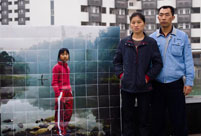The management of China's hukou, or household registration, system has failed to keep pace with urbanization, a research institution has warned.
The warning was based on a recent survey finding that although more than 50 percent of China's population live in cities, only about a quarter of city dwellers have obtained hukou documents in cities, the institution said.
The report on the urbanization and movement of China's labor force, released by the China Data Center of Tsinghua University, showed that 27.7 percent of respondents said they had hukou in cities as of 2010, a rise of some 7.7 percentage points over the previous two decades.
The report polled some 12,500 adult respondents nationwide and the results were made public over the weekend in Beijing.
However, official statistics show that the urbanization rate rose from 22 percent in 1990 to some 52.6 percent in 2012, the report said.
"We were very surprised to find out that reform of the hukou system lagged so far behind the actual mobility of the population," said Li Qiang, director of the center, who participated in the research.
The distorted hukou system, which fails to reflect the mobility of the population, provides an invalid reference for the government in allocating resources and making decisions in terms of urban planning, he said.
"The research findings also demonstrate an urgent need to speed up reform of the hukou system," he said, "as people are the key to urbanization."
The survey also showed that more than 70 percent of polled migrant workers said they have no plan to return to their home village for work.
Meanwhile, about one-third of migrant workers said they want to settle down in cities.
The rest said they either have not made up their mind or have no intention to stay in cities.
 Annual airshow kicks off in Houston
Annual airshow kicks off in Houston U.S. Navy Carrier Strike Group stages military exercises
U.S. Navy Carrier Strike Group stages military exercises Volkswagen showcases new energy vehicles in Beijing
Volkswagen showcases new energy vehicles in Beijing  Different eye catching shows at housing fairs in China
Different eye catching shows at housing fairs in China Special family portraits call attention to left-behind children
Special family portraits call attention to left-behind children Migrant children’s pain and joy in city
Migrant children’s pain and joy in city Lingerie show dazzles Wuhan Motor Show 2013
Lingerie show dazzles Wuhan Motor Show 2013  Running in fun customs at Beijing Int'l Marathon
Running in fun customs at Beijing Int'l Marathon  Weekly Sports Photos
Weekly Sports Photos Unveil PLA air force base
Unveil PLA air force base  World has never been dark-- a blind kid’s life in Tibet
World has never been dark-- a blind kid’s life in Tibet Oriental education or western education?
Oriental education or western education? China in autumn: Kingdom of red and golden
China in autumn: Kingdom of red and golden Pet costume competition
Pet costume competition Chinese screen goddesses from Beijing Film Academy
Chinese screen goddesses from Beijing Film Academy Day|Week|Month